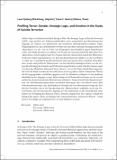Files in this item
Profiling terror : gender, strategic logic, and emotion in the study of suicide terrorism
Item metadata
| dc.contributor.author | Gentry, Caron Eileen | |
| dc.contributor.author | Sjoberg, Laura | |
| dc.date.accessioned | 2012-05-10T00:13:16Z | |
| dc.date.available | 2012-05-10T00:13:16Z | |
| dc.date.issued | 2008 | |
| dc.identifier | 20025972 | |
| dc.identifier | 03235e00-b5ef-4776-a9d3-a1f49e8bb6d6 | |
| dc.identifier | 77950783346 | |
| dc.identifier.citation | Gentry , C E & Sjoberg , L 2008 , ' Profiling terror : gender, strategic logic, and emotion in the study of suicide terrorism ' , Austrian Journal of Political Science , vol. 2008 , no. 2 , pp. 181-196 . | en |
| dc.identifier.issn | 1615-5548 | |
| dc.identifier.other | ORCID: /0000-0003-2035-8424/work/77132503 | |
| dc.identifier.uri | https://hdl.handle.net/10023/2597 | |
| dc.description.abstract | Robert Pape's well-received book, Dying to Win: The Strategic Logic of Suicide Terrorism (2005), presents what appears to be a gender-neutral study of both male and female suicide terrorists. Pape's main argument is that suicide terrorism is a strategic and rational terror campaign against democracies. While the study argues that male and female suicide terrorists are rational individuals, it depicts women as motivated by emotion. Thus, this article argues that gender-neutral work is rarely gender-neutral and such studies fail to recognize the social and political impact of gender. Furthermore, we argue that the rational choice model presented by Pape furthers the gender divide by emphasizing values associated with masculinity over values associated with femininity. As an alternative, we propose three propositions to change the study of suicide terrorism to include both political and emotional motivations. We propose that gendered presentations of female suicide bombers reify stereotypical images of gender and of suicide bombers, that silence about the complexity of suicide bombers' motivations does not erase the many variables that go into martyrs' decisions, and that adding emotion to the study of suicide bombing counterbalances the narrowness of the "strategic actor" model. The essay concludes with evidence from the study of the Chechen "black widows" that demonstrates the explanatory value of these propositions. | |
| dc.format.extent | 250201 | |
| dc.language.iso | eng | |
| dc.relation.ispartof | Austrian Journal of Political Science | en |
| dc.rights | (c) 2008 Österreichische Gesellschaft für Politikwissenschaft (ÖGPW, Austrian Political Science Association) | en |
| dc.subject | Gender | en |
| dc.subject | Terrorism | en |
| dc.subject | Rational actor | en |
| dc.subject | Feminism | en |
| dc.subject | JZ International relations | en |
| dc.subject | HV Social pathology. Social and public welfare | en |
| dc.subject | SDG 3 - Good Health and Well-being | en |
| dc.subject | SDG 5 - Gender Equality | en |
| dc.subject | SDG 16 - Peace, Justice and Strong Institutions | en |
| dc.subject.lcc | JZ | en |
| dc.subject.lcc | HV | en |
| dc.title | Profiling terror : gender, strategic logic, and emotion in the study of suicide terrorism | en |
| dc.type | Journal article | en |
| dc.contributor.institution | University of St Andrews.School of International Relations | en |
| dc.description.status | Peer reviewed | en |
| dc.identifier.url | http://www.oezp.at/getMagazine.php?id=55 | en |
This item appears in the following Collection(s)
Items in the St Andrews Research Repository are protected by copyright, with all rights reserved, unless otherwise indicated.

